Peter MALONE
Saturday, 18 September 2021 19:18
Decline and Fall ....of a Birdwatcher

DECLINE AND FALL... OF A BIRDWATCHER!
UK, 1968, 113 Minutes, Colour.
Robin Phillips, Genevieve Page, Donald Wolfit, Leo Mc Kern, Colin Blakely, Robert Harris, Felix Aylmer.
Directed by John Krish.
Decline and Fall... of a Birdwatcher offers an anti-hero, brought up to date from Evelyn Waugh's novel of the 1920's, is Paul Pennyfeather. Critics object to Waugh films over-doing English cranks and eccentrics, but the treatment here is not as heavy as the hilarious vulgarity of Tony Richardson's The Loved One. Rather the cranks are popular caricatures of schoolmasters, judges, gaolers, criminals. Waugh could get away with his satire because of his skill in word sketching. He could skip from sketch to sketch. The risk of dramatising Waugh is that the eccentrics are continually before the audiences' eyes and in action. Therefore, Decline and Fall and The Loved One, although necessarily more heavy handed than the novels, seem to me to be genuine Waugh. Robin Phillips (like a young Dirk Bogarde) plays the innocent hero while 'the whole world is bent'. A host of English character actors depict the Waugh collection of oddities.
1. The significance of the title? The addition of a birdwatcher and its ambiguity? Its relationship to Gibbons' classic? Audience expectations from an Evelyn Waugh story? The updating of the original novel? The additions? A satisfactory film version of a novel?
2. The influence of Evelyn Waugh's reputation? The outlook that he had on the world and on people, the satirical approach, characters and caricatures? Heightened and ridiculous situations? The type of insight he strove for via comedy?
3. The importance of the use of colour, decor and its elaborate presentation, modern look? The credits, for example?
4. The importance of the focus on Paul? How sympathetic a character? The opening and his misfortune, the presentation of his character, a victim? The innocent young man? His naivety in accepting his job? Fate and the directions in which it led? Chance and those that he took? His opportunism? A pleasant kind of nun in the school? His infatuation with Margot? His accepting the job? The reality of his love, yet his being out of place in such a world? His naivety in believing in marriage? The inevitability of his being tricked? The effect of his being branded a criminal? How much was he affected by his associates? The experience of prison, of being rescued? On what was he basing his new start in life? Was he a real character or a type? How was he to be interpreted if he was a type of the innocent young man?
5. The importance of Margot and the role of the modern woman? In relation to the naive young man? Causing his decline and fall? The significance of her initial appearance in the rain? Her style, fashion, clothes, the colours of her cars? The men who attended her? Her relationship with her son? The elaborate nature of her how? Seeing her at work in the prostitute traffic? The glossy look and yet the evil underneath? Her connections, truth and lies, using people? Her getting out of the marriage? Her marrying the Home Secretary? As a symbol of the type?
6. The satire on English schools and their type? The running of the school itself? Fagan and his tyranny, Grimes and his deceptions, his bigamy? Prendergast and his being hidden away? Flossie and her desperate need to be Harried? Philbrick and his criminal background? The parallel between the school and the prison and the same people being there?
7. The significance of Potts, his relationship with Paul, his seeking out of the truth?
8. The satire on politics, especially in the role of the Home Secretary and his influence?
9. The grimness of prison and the satire on prison?
10. The film's humorous detail and getting its audience to laugh at it and its victims?
11. How accurate a satire on England and England's pretensions?
Published in Movie Reviews
Published in
Movie Reviews
Tagged under
Saturday, 18 September 2021 19:18
Wherever She Goes

WHEREVER SHE GOES
Australia, 1950, 81 minutes, Black and White.
Suzanne Parrett, Nigel Lovell. Muriel Steinbeck.
Directed by Michael S. Gordon.
Wherever She Goes was one of the comparatively few feature films made in Australia between 1945 and 1970. It is a biography of the celebrated pianist Eileen Joyce. She provides the playing for the considerable piano excerpts during the film. The film features some of the prominent Australian actors of the time. The film is attractive, traces the life of the pianist from her early days in Tasmania to international celebrity. It has the overtones of the conventional biography of a star - with the background of the Australian bush, but seems rather contrived by later standards. A Hollywood version of an Australian musical celebrity, Marjorie Lawrence, is the 1954 Interrupted Melody with Eleanor Parker, directed by Curtis Bernhardt.
1. The indications of the title and having music wherever she goes?
2. How enjoyable a musical film and how interesting as a biography?
3. Comment on the techniques of Australian filming and their impact in 1950 and now.
4. The presentation of the real Eileen Joyce and her piano-playing and her achievement? How great was the achievement?
5. The Australian background: Tasmania and the way of life in the bush, isolation, family life in this situation, the houses and shacks? The details of travel to the west? Western Australia and the mines? Kalgoorlie as a town? The bigness? How important was this environment on Eileen?
6. The portrayal of family and interrelationships? of mother and father and poverty? Brother and sister, love and fights? The father's severity? The mother's support? The picture of hardships?
7. Eileen and Danny, and Danny as a man of dreams? The mouth organ?
8. The importance of lessons in Kalgoorlie, her begging, gambling, the need for practice? Her love of the piano?
9. The people who had influence of Eileen's life: the nuns at the school and their lessons, the music lessons and the money, the friendly people at the hotel, Bob, her parents, the neighbours? How important was their impact on her life?
10. Eileen Joyce's achievement? As a natural talent, the sequence of events, the illustration of her talent?
11. The importance of the eisteddfod sequence? Her skill in playing and her pride in playing? The nature of the collection of the people to support her trip to Perth?
12. The beauty of the film and the presentation of music and someone who loved music? The importance of the biography, audience response to a biography in term of the facts, the insight into a character? How valuable was the film as a musical biography?
Published in Movie Reviews
Published in
Movie Reviews
Tagged under
Saturday, 18 September 2021 19:18
Watch the Shadows Dance
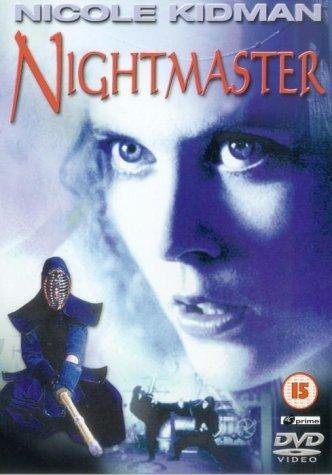
WATCH THE SHADOWS DANCE
Australia, 1986, 90 minutes, Colour.
Tom Jennings, Vince Martin, Nicole Kidman, Joanne Samuel, Craig Pearce.
Directed by Mark Joffe.
Watch the Shadows Dance is an Australian film about youth, a martial arts film. The focus is on the present or the future, on young people bored with school but engaged by athletics, gymnastics, martial arts and life and death games. Adults are represented by absent parents, an exploitive sports master and a concerned teacher. There is also an underlying theme of drugs. It all works together enjoyably enough - if undemandingly for an action adventure.
1. Australian martial arts adventure? In itself, comparisons with international product? Enjoyable?
2. Sydney locations, the present or a future city, the focus on the city buildings, the school, the warehouses? Familiar ... but yet?
3. The importance of the stunts, special effects, choreography? Style and pace? Musical score and the songs?
4. The title and its interpretation? For the characters?
5. The familiar aspects of the city, the isolation, cold, school and cliques, martial arts training, the dark disco, drug dealing? The emphasis on youth, achievement?
6. The Game: skill, championship, danger, winning, achievement? Popular? The training, the group meeting, the computer working it? The individuals subordinate to the Game? The group challenge? Deadly? The climax within the Game?
7. Martial arts, karate? Gymnastics? Athletic scenes, training? Purpose? The pros and cons?
8. The contrast with study: boredom, relevance? The critique of school?
9. Robbie as the champion, his place in the group, the Game? Steve and the training, his admiration for him? Miss Bain and her concern, interfering? The warning? Friendship with Amy? Playing the Game, Brian and the danger, saving him from death? Competitiveness? Guy Duncan and his sinister presence? Suspicion? With Steve? His death? Robbie disillusioned with Steve? The build-up to the fight, the television? The truth? The finale with the Game and winning? The background of his family life, his mother and the television, his nightmare and people changing characters in the dream?
10. Amy and her liveliness, in school, in reality, friendship, the contrast with her behaviour in the dream? Her skills and stunt work?
11. The sketch of the group, Brian and the danger, the boy in the wheelchair, the support of the Came?
12. Steve and his military background, survival, wanting to be top, relying on drugs, his violence, the relationship, with Miss Bain, Guy Duncan, killing him, the fight with Robbie, the confrontation in the Game, his death? Not able to hold on?
13. Miss Bain, school, warning, concern about Steve? Her relationship with Steve, concern about Robbie?
14. The disco and the bar, the environment, the music, the drugs? Doug Ashdown as the manager?
15. Guy Duncan, contrast with Robbie, the drugs, power, hold over Steve, his death?
16. The point of view of the film? Education and sport? Martial arts?
Published in Movie Reviews
Published in
Movie Reviews
Tagged under
Saturday, 18 September 2021 19:18
Waltzing Matilda
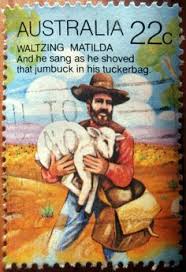
WALTZING MATILDA
Australia, 1933, 77 minutes, Black and white.
Pat Hanna, Joe Valli.
Directed by Pat Hanna.
Waltzing, Matilda was written and directed by Pat Hannah. It was the third in a series about central characters, Jim and Chick, that he developed in Diggers and Diggers in Blighty. The film was a production of Frank Thring Senior's Melbourne studios, Eftee Studios.
The film is not as effective as the Cinesound entertainments being directed by Ken Hall in Sydney. Waltzing Matilda is a bit staid, a bit studio-bound. However, there is a nationalistic prologue featuring Bondi Beach and other Australian scenes. The film takes its title from Banjo Paterson's song even using it for a waltz in a ball sequence.
The film, is a Depression comedy with memories back to the mateship of World War One. Pat Hannah does some good comic turns. However, the characters are somewhat stereotyped and there is, as always at this time, the reverent reference towards England. There is great praise of the bush compared with the city.
Included in the supporting cast is a young Coral Browne.
1. Popular '30s comedy? Australian ethos? The nationalistic prologue with Bondi Beach?
2. Black and white photography, locations, country and city, editing and pace, score? The use of 'Waltzing Matilda"?
3. The title, Australian tone, Banjo Paterson? The diggers and their? The Australian aristocracy? The workers? Police?
4. The style of comedy: verbal, visual? Farce? Incidents? Men and women? Ocker styles?
5. The focus on the city: boarding houses, the police and drinking? The landlady? The escape? Contrast with the country: the roads, cars, paddocks and sheep, country society -drawing room style with English influence?
6. The mateship of Chick and Jim: in Melbourne, night on the town, memories of the war, drifting, the avoidance of the police, the landlady, the routines for the quick escape, on the road, the encounter with Dorothy, fixing the car, avoiding the police, avoiding the agent searching for them? The job, hiding, out in the bush? Jim) in love? Dorothy’s father,
giving him the job? In action? The dance, the quick engagement? The unmasking? Jim as a Plan of property? Reconciliation? Chick going on his way?
7. Chick and his ocker style, gawky? Accent? With MacTavish?, his clothes, words, manner? The elaborate drinking sequence and Chick's shyness? The lanky ocker hero (predecessor of Chips Rafferty)?
8. Dorothy as lively heroine, on the road, her pretence, getting them the job, the encounters with Jill, falling in love, the engagement, her sulking when lie was supposed to have been a criminal, the reconciliation?
9. The parent generation, the father and his drinking, the dowager wife, the daughters and their husbands?
10. Mac Tavish and his place in the series of films, the information about him, giving the police the information, his work, the whisky bottle and the mark, the girl and the proposal, coping with Chick?
11. The presentation of the Light Horse and the exercise, part of the plot?
12. The agent pursuing from Melbourne, his troubles with the car, trying to discover Jim? The final revelations? Everything well - as regards the bush, wealth, high connections? A piece of Australiana?
Published in Movie Reviews
Published in
Movie Reviews
Tagged under
Saturday, 18 September 2021 19:18
Wake in Fright
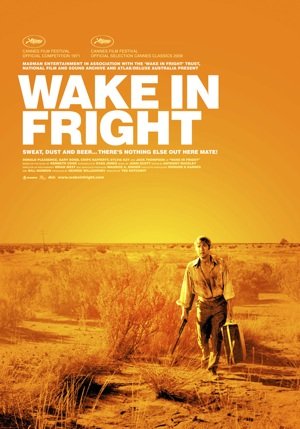
WAKE IN FRIGHT
UK/Australia, 1971, 108 minutes, Colour.
Donald Pleasence, Gary Bond, Chips Rafferty, Sylvia Kay, Al Thomas, John Meillon.
Directed by Ted Kotcheff.
Wake in Fright is a joint British- Australian venture, a film that should have been made years ago because it marks a greater sophistication in film-making as well as a more mature look at Australia and Its people than the usual matey caricatures, In fact, this is a horrifying film. savaging the Australian Image that is held sacred as some kind of myth. And yet it is an image of mindlessness and some of the lowest common denominators of living.
Gary Bond plays John Grant, the teacher of Tiboonda (beyond Broken Hill) who wearily starts his holidays at Bundanyabba. 'The Yabba', a mining city. He Is overpowered by the grinning code of hospitality he despises and, via two-up losses, goes on a weekend bender that makes the audience wallow in Incessant beer-guzzling, frigid sex, the boys' sparring and showing how tough they are, and a brutal spree of kangaroo-slaughtering. This is what the harsh Australian environment can do to a man. This Is what can happen to a man who Is willing to lose control of himself and experiment in degradation - Australian-style. And it drives a man to the point of death.
Donald Pleasence, as an alcoholic doctor who has come satisfactorily to terms with his depravity, has some cynical lines to say about civilisation and the hard lives of men who live and work at a place like the Yabba.
This is a well-made film but it is not a 'nice' one. It is an overstatement worth making.
1. What does the title mean?
2. How did the film set atmosphere, mood and theme during the credit sequences at Tiboonda? Was this done well?
3. How did the film show the desert landscape as making a desert of a man's spirit?
4. Was the film's presentation of this section of Australian and the Australian way of life accurate?
5. What kind of city was 'the Yabba? What kind of people were its inhabitants?
6. What impact did the incessant drinking, of beer have?
7. Was Jock a good policeman, a good man?
8. What kind of man was John Grant at the beginning of the film? His disgust at his job and his life bonded by the Education Department? Did he have a strong character, a sympathetic personality?
9. Was he typical of the ordinary man? Would you agree that John Grant's downfall and degradation stood for what is possible for any man?
10. How strongly did Grant despise the people and mateyness of the Yabba when he saw the two-up school and talked with Doc?
11. Why did Grant become so absorbed in the two-up? (How was the two-up and beer way of life presented, sympathetically, humorously, critically?)
12. What could Grant have done after he lost his money? Should he have gone to Sydney, considering his memories of Robin and his ambitions to go to England?
13. What was wrong with Janette? Was she 'typical' of the style of life at the Yabba? Why was Grant repelled by her? How much did this contribute to his going on the bender at the party? What pushed him on to the drinking, boasting and collapse?
14. Why did Doc take him in? How do you explain Doc? What was wrong with him?
15. How typical of the Australian way of life (or the Australian image) were Doc and his friends?
16. What effect did the kangaroo hunt and slaughter make on you? How was it shown to be part of the Australian image? Is this true?
17. How did Grant's slaughtering of the baby kangaroo show that he had lost his sense of his own dignity as a man? Why did he do it? Did he enjoy the hunt and the drinking?
18. What was the irony of Doc’s monologue on culture and civilisation while he was drunk, Grant was unconscious and the two typical he-men brawled on the pub veranda; and then they smashed the place up?
19. Why did Grant leave Doc?
20. What was the purpose of the sequences of Grant's walking and hitchhiking through the desert?
21. Did Jock's friendship help Grant after the weekend?
22. What was the significance of his finding himself back at the Yabba? Why did he abuse the man who grave him the lift and attack the sacred cow of obligatory having a beer?
23. Why did he want to kill Doc? What did the sequences of his imagination running riot signify? Why did he want to kill himself?
24. Why did Doc meet him as he came out of hospital?
25. Why did Grant go back to Tiboonda? What else could he do? What had he learnt about life and about himself? What did the audience learn about the squalid side of life and coming back to earth?
Published in Movie Reviews
Published in
Movie Reviews
Tagged under
Saturday, 18 September 2021 19:18
War Lord, The
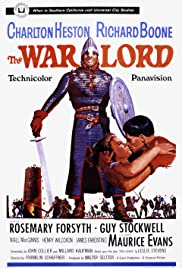
THE WAR LORD
US, 1965, 120 minutes, Colour.
Charlton Heston, Richard Boone, Rosemary Forsyth, Maurice Evans, Guy Stockwell, Niall Mac Ginnis, Henry Wilcoxon.
Directed by Franklin J. Schaffner.
The War Lord is a mixture of serious drama from the feudal period along with several battles with Normans clashing with Friesians. It is a star vehicle for Charlton Heston, who at this time made such films as The Agony and the Ecstasy and Khartoum.
While the battle sequences at beginning and end of film give the impression of a stirring action drama, the whole focus of the film is on Heston's role as Chrisagon, appointed by the duke to manage a remote and lawless area of Britain. Wounded in battle, entrance by the traditions of the Druids and their pagan rites, he demands the droit du seigneur, spending the marital night with the wife of a subject. (This theme was presented strongly at the beginning of Braveheart.) The young woman is played by Rosemary Forsyth (who, thirty years later, appeared in such films as Disclosure and John Carpenter's Ghosts of Mars). Richard Boone is gruff as the guardian for the lord, Guy Stockwell struts as his brother. A young James Farentino is the embittered husband. The head of the Druids is played by Niall Mac Ginnis, the head of the Friesians by veteran Henry Wilcoxon. Maurice Evans is rather mincing as a priest who acts as a liaison between the Christians and the Druids. The film offers a contrast for Charlton Heston between this rather subdued role and his all-conquering El Cid, both films set in the 11th century.
1. The mixture of action drama with serious issues in the feudal period? The film based on a play (by Leslie Stevens)? The film opened out?
2. The 11th century settings, the remote lands, the marshlands, the coast, the castle, the village? Costumes and décor? Armaments, siege weapons? The atmosphere of the period? Musical score?
3. The title, the focus on Chrisagon, his twenty years of doing battle, his liege homage to the duke, in charge of the area, to battle against the Friesians?
4. His arrival, his character, Charlton Heston's style and screen presence? Twenty years, no relationships, on the battlefield, saving his brother from having to fight? His being aided by Bors? His arrival, his attitude towards the Friesians, the initial battles? The taking of the boy? His seeing the villagers, seeing Bronwyn? His infatuation with her? In the water, letting her go? The festivities, the droit du seigneur, his not wanting to follow it, attracted by the pagan rituals, the explanation of the priest, the head of the village explaining that if he took her according to Christian principles it would be rape, if he took her according to pagan principles, it was part of the tradition? His disregard of Marc? His rule of the area, relationship with the priest and discussions with him, the clashes and jealousy of Draco, reliance on Bors? His taking Bronwyn, her attraction to him, the wedding night? His not wanting to let her go? The invasion, the betrayal by the dwarf, the siege, dangling the boy over the parapet by Draco, Draco going to get help, Bors and the cutting of the boats? The battle, Draco and his being in charge, the clash with his brother, their fight and his death? Chrisagon giving the boy back, the withdrawal of the Friesians, the offer of safe passage? His sense of duty, remaining? His sending Bronwyn away? The villagers and the attack, Marc and his attempt on Chrisagon's life, Bors killing him? A film of weariness, disillusion?
5. Bronwyn, her place in the village, with Marc, his father? Suspected of being a witch? In the water, the rescue by Chrisagon? Her being summoned to the palace, holding him down during the cauterising sequence? The preparation for marriage, her resistance to Chrisagon, the droit du seigneur, her going, her love for him, her staying? Marc, in the village, the celebration, his impetuosity, his grief at what she had done? Animosity, the villagers turning against Chrisagon? Marc's attempt on his life? Bronwyn and her staying, support of Chrisagon, his sending her away?
6. Draco, the relationship between the two brothers, Draco and his love for power? Treatment of the villagers, disdain? Jealousy of his brother? The discussions with the priest, setting up the droit du seigneur? His going to get reinforcements, taking over, the clash with his brother, his death?
7. Bors, the history of Chrisagon's father, fidelity, protection? In the sieges? Advice? His fidelity to the end?
8. The priest, isolated, Christian traditions, condemning the droit du seigneur, yet the discussions with the Druids?
9. The head of the village, his wanting to make peace? His accepting the laws? Fighting against Chrisagon? The alliance with the Friesians, the Lord of the Friesians, losing his son, the dwarf finding him, manipulating ransom, his being killed with the arrow? The boy going back?
10. The detail of life in the feudal village? The transition between the Dark Ages and the Middle Ages?
Published in Movie Reviews
Published in
Movie Reviews
Tagged under
Saturday, 18 September 2021 19:18
War Bride, The
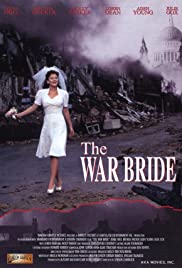
THE WAR BRIDE
Canada, 2002, 105 minutes, Colour.
Anna Friel, Brenda Fricker, Aden Young, Molly Parker, Loren Dean.
Directed by Lindon Chubbock.
A Canadian- British co-production that takes audiences back to the 1940s, first of all to the Blitz in London and then to the open and isolated prairies of Alberta. The pressbook notes that there were over 40,000 war brides who migrated from Britain, a great number of them to Canada which had an open and generous policy of bringing to this new world many of the brides married in the UK by Canadian servicemen. This story is based on the memories of the daughter of a real-life war bride.
The opening looks familiar from many a film: the factory girls walking through the bombed streets, going to a dance hall, flirting with the troops, one of them attracted to a lonely soldier, quickly marrying him and giving birth to their daughter while he is away on active service. Anna Friel brings a cherry and cheeky presence to her role as Lily but it is often hard to see what she sees in Aden Young's rather dour Charley Travis
It all changes when she gets to Canada (with an extraordinary set for Montreal station which looks like a mini train stop in the middle of nowhere). But Lily has to go much further west only to be greeted (no, that is not the right word), no, just met by an adamantly severe Mrs Travis (Brenda Fricker) and a sullen Sylvia, Charley's sister (Molly Parker). The ramshackle farm is not what Lily had been told or dreamed of. It takes her longer than we were expecting to bring the Travis family round. Brenda Fricker is reticent though forceful as the mother and we can always feel the resentment in Molly Parker's polio-victim sister. Loren Dean is the local delivery man.
Anna Friel sustains her performance so that we share her hardships, her concern for her daughter, her attempts to be kind to the Canadians and her dismay when Charley returns. It is a nostalgic memoir.
1. Memoir, an exploration of the past, its relevance to the present?
2. The atmosphere of London, the Blitz, the streets, the bombed homes, the underground station? Canada by contrast, the railway, the towns, the isolated farm?
3. The re-creation of the period, costumes, décor? The range of songs, memories of wartime, the dances?
4. The title, the reality of the war brides, the thousands coming from Britain to Canada, Canada's policy of welcoming them?
5. The bomb site, the Blitz, the girls in the street, laughing, their work, going to the club, flirting with the men, the dancing, the soldiers there, the atmosphere of the times?
6. Lily, her orphanage background, her friendship with Sophie? At the dance, her reticence, flirting, meeting Charlie, the dance, the kiss? His loneliness and attraction? Preparations for the wedding, making the dress, the ceremony?
7. Her pregnancy, Charlie's visit, the birth, the daughter, her going to work, the news about Canada for Sophie and herself?
8. The voyage, Canadian policy, in the hammocks on the boat, going on the train, Sophie and her being met in Montreal, the comfortable stop, the opposite for Lily, going further, the plains of Alberta?
9. The Travis family, the lack of welcome at the station, the family story, Frank and his grave on the property, Betty and her toughness, survivor? Sylvia and her hostility, the polio, using her leg as an excuse, urging Lily to cover up, stopping her wearing red? Prim, puritanical? Their anger at Charlie, wanting his pay cheque, suspicious of Lily, Peggy and her being jilted by Charlie?
10. Lily and the baby, the room, her clothes, cups of tea, talking, her being bright, not wanting to cover up, not getting any letters from Charlie, giving Betty the money, the gesture of making the apron for Betty, the slip for Sylvia, the rejection? Meeting Joe, dancing with him? Her wanting to leave, getting him to drive the car, kissing but reluctant? Peggy and her getting her hair done, the clients of the Travises and their criticisms? Her going shopping, Peggy refusing the thread, getting the eggs, the farm? Sophie and her visit, talking things over? Making the record for Charlie?
11. Her being kind, making the clothes, gradually thawing out the family, Sylvia and the dress, teaching her to dance, teaching her to drive the car? Sophie's second visit, deciding not to leave? The importance of the English dinner, the family, the criticisms, the enjoyment?
12. Charlie's sudden return, in himself, the experience of the war, his coldness, sexual frigidity, reading his journal? Building the outside toilet, Joe helping him? The party, the dancing, Peggy's anger, his fight with Joe?
13. Peggy and her hurting Lily, her spite? Joe, his not being able to go to war, his dreams? The dance, Sylvia in love with him, his talking with her, the proposal, a future together?
14. Betty's harshness, her telling the story, her changing, being able to laugh? Sylvia, her leg, her bitterness, learning to drive the car, the meal, the dance, Joe's proposal?
15. The war's end, listening on the radio, the celebrations in the town, the joy, hope for the future?
16. A film of sympathy, understanding, history?
Published in Movie Reviews
Published in
Movie Reviews
Tagged under
Saturday, 18 September 2021 19:18
Willa
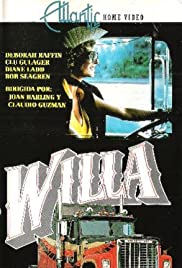
WILLA
US, 1979, 95 minutes, Colour.
Cloris Leachman, Deborah Raffin, Clu Gulager, John Amos, Diane Ladd.
Directed by Claudio Guzman, Joan Darling.
Willa focuses on a young separated woman, her children, friendships, her wanting to be a truck-driver. Deborah Raffin brings charm to this central role.
The film is a telemovie, a piece of Americana designed for an American audience. Supporting characters help the film, especially Cloris Leachman a buxom, wisecracking truck-driver and John Amos as the manager of the firm. There is a sub-plot about Willa's children, her alcoholic mother (played by Diane Ladd) and her inability to look after her children.
1. Interesting and entertaining telemovie? Piece of Americana? Characters?
2. Location photography, the small town, the diner, the trucks, the open road, homes, welfare officers? The range of songs used throughout the film, popular songs, truck songs?
3. The title and its focus on Willa? A character, her hopes? Relationships? Strengths and weaknesses?
4. Willa at work, her ambitions to drive a truck, clashes with the truck-drivers? Her husband leaving her and her not knowing where he was? Her children and her care for them, welfare questions, the discussions with the woman at the welfare office, her wanting to leave them with her mother, their being fostered out, her being hurt when she saw them so happy with the foster parents, getting her children again? Joe and his loving support, relationship with pregnancy, driving with the baby, the birth of the baby, the beginning of a new life? Her wanting to drive a truck, Virgil, trying the driving, carrying the vegetables? The lessons? The clashes with the men? Her encounter with the tough lady truck-driver? Their driving, across America, the experience? The friendship? The group of women truck-drivers? Her return home, her having to get her life in order? Her future?
5. The portrait of the children, their love for their mother, the absent father, the alcoholic, Welfare, their going to the foster parents and their being well looked after? Clashes with their mother? Reconciliation? Joe and his presence, love for Willa, support, relationship with her, the baby? The future?
7. Willa's mother and her drinking, saying that she was better, not being able to look after the children, the scenes of her desperation?
8. Cloris Leachman as the buxom truck-driver, friendship, skills, example? Support?
9. Virgil and his interest, wariness, helping Willa, her training, his support of her?
10. Willa at work, at the welfare office, regulations, the law, the discussions with Willa, trying to make her understand, the taking of the children, Willa's attacking her?
11. Themes for the popular audience? work, family, welfare, relationships between sexes?
Published in Movie Reviews
Published in
Movie Reviews
Tagged under
Saturday, 18 September 2021 19:18
Wilful Murder

WILFUL MURDER
Japan, 1982, 132 minutes, Black and white.
Directed by Kei Kumai.
Wilful Murder is a Japanese thriller with political overtones. The setting is 1949, the influence is still the American occupation and the determination of America against communism, and its using Japan in this stance. There are leftist movements in Japan. The film focuses on a Japan National Railways official found dead on railway tracks. The film is made in black and white, mixing documentary and newsreel footage with the drama.
The film examines C.I.A. involvement in Japanese politics. The film takes the form of an investigation by a newspaper reporter. He has an obsession and examines the case for over ten years. Various institutions try to shield the truth from him. Critics have compared this film to such political films as Italian Francesco Rosi's dramas.
1. The impact of the political thriller? Documentary aspects? History? Drama and characters? The international patterns of the post? World War Two years?
2. The work of the Japanese film industry? Its perspective on history, politics, its international dealings with the U.S. and with the communists? An 180s reassessment of this politics? Responsibilities? Impact on Japanese audience, international audience?
3. Black and white photography, creation of the period, the echoes of the times, newsreel footage incorporated into the film? The score and its American style? The dramatic style ? particularly theatrical and Japanese (for western audiences)?
4. The use of names and dates, times, the dynamic of the investigation? The building up of the case by interrogation and flashback?
5. Japanese politics and the United States, pressures, pride, the Dodge Line and its enforcement? Unemployment, industrial strife, communists, scapegoats, murders, accidents, plots and riots? Korea and arms questions? The vagaries of Japanese politics of the '50s and '60s? The riots to the games? Deals, money etc.?
6. The pro-American and anti-American attitudes? The C.I.A., plots, influence? The use of Japanese gangsters and thugs?
7. The need for the expose ? for the Japanese public, for integrity, for an analysis of capitalism and socialism, for the combating of political terrorism?
8. The crime itself and its reconstruction: the role of the victim, the abduction, the store, the change, battering, transport, when the victim was dead or not, the railway line and death? Autopsies? The range of conflicting evidence e.g. the girl giving testimony later?
9. The repercussions and the discrediting? Thugs, jail, money, the factory expansion?
10. The portrait of the journalist? The relationship with the police? Interest, suspicions, test, autopsies and detail, tracing evidence, the long years and the open case, letters and information, discovering the criminal and his wife, payment and information? The people involved, fears, death threats?
11. The wealthier characters, the leaders ? and the lack of evidence e.g. the factory?
12. The character of the journalist: integrity, skill, reports, silence, clues and regrets?
13. The police assistants, the office, the authorities, orders etc.?
14. The newspapers and their role in such investigations?
15. Cover-ups, conspiracies and the need for the expose? A satisfying, particularly Japanese, thriller?
Published in Movie Reviews
Published in
Movie Reviews
Tagged under
Saturday, 18 September 2021 19:18
Wild River
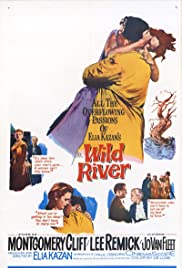
WILD RIVER
US, 1960, 115 minutes, Colour.
Montgomery Clift, Lee Remick, Jo Van Fleet, Albert Salmi, Jay C. Flippen.
Directed by Elia Kazan.
Wild River is an impressive film by Elia Kazan. Kazan, an actor turned director and writer, with social leanings, had made such striking films as A Tree Grows in Brooklyn and Gentlemen's Agreement (Oscar 1947) and Boomerang in the 40s. In the 50s he made such impressive films as Viva Zapata, On The Waterfront (Oscar 1954), East of Eden, Baby Doll. He was not to make so many films after Wild River: America, America, an autobiographical film in 1963, The Arrangement, a big business study from his own novel in 1969, The Visitors from his novel in 1971, The Last Tycoon in 1976. Wild River takes questions about the Tennessee valley and the building of dams in the 30s and the repercussions on individual citizens. It shows both sides quite effectively and the tension generated by progress in such communities. Montgomery Clift and Lee Remick are effective in the central roles, but Jo Van Fleet is memorable in the role of the old lady who has to be evicted. She had won her Oscar for best supporting actress in Kazan's East of Eden, 1955. Photographed beautifully in colour and Cinemascope, the film is interesting, entertaining and does raise questions about environment.
1. What was the overall impact of this film? The relevance of the theme for understanding the 30s? The fact that it was made in the early 60s? The impact and importance in later decades?
2. The film was a critical success. It was not popular? Is this understandable?
3. Comment on the film's use of colour, locations, Cinemascope, the background of the Tennessee Valley Authority?
4. How important was the quality of the performances for the film? The impact in human terms of the environmental problem?
5. How well did the film incorporate human interest in an American historical situation? In the environmental clash? In the American Pioneer tradition?
6. The film's focus on the river in the title? The presentation of the river at the beginning. its destructive impact? The newsreel reportage style of the opening? The situation of the people who lived on the river? Settling the land and the pride of their heritage? The importance of Ella's allegory about the black man's dog? The rights of people to take away other peoples rights? The river finally destroying the house? The symbolism of the burning of Ella's house? Her grave at the end and its not being flooded? The ending with the optimistic dam contrasting with the initial flood? How are the river, the island, the house, the grave, the dam, the ingredients for a visual summary of the themes?
7. How important for the film's themes was the collaboration of the people of the place? The Southern states, the Tennessee River ravaging the islands and the land? The pioneer spirit? The isolated life of these people? Their living earned from the land? Pioneer stock but depressed? The relationship of negroes and whites? The ill feeling in the town, the mayor, the sheriff, the vigilantes? The attitude towards people from outside? How successful a drawing of a picture of an isolated depressed community was this?
8. How important was the visual presentation of the times; the 30s, the depression, race relationships in those times, the New Deal and suspicion of future development etc.?
9. The character of Chuck, an outsider, his confidence, his belief in his job? The initial contact with the guards and their hostility? His sensitivity as a person, as a gentleman? His being humiliated yet persisting? The importance of his listening to Carol? His changing of attitude towards people, yet belief in his work? The importance of his love for Carol? Humiliation by the people? The vigilantes? How well was his character explored? The defect of the environment and the people around him? As a gentle hero for the film?
10. Carol as a young woman of this place and this time? Her relationship with Ella, as a widow, not having the opportunity to talk, her response to Chuck, her change in growing in love? How convincing was this transformation? The insight into a woman and her relationship with a man? Her relationship to her children? Building a future?
11. How central was the role of Ella? The success of Jo Van Fleet's performance? The film's focusing on her face? Her indomitable attitude and her strength? Her stubbornness and her age? The significance of her speeches and the way they were filmed? The pathos of the eviction? Her ageing and dying when she left the island? The burning of the house, the significance of her grave on an island in the river? How important was her character as a focus on the film?
12. The importance of the supporting characters, as developed characters in the film, their contribution to the plot and to themes; Bailey and his arrogance, Walt and his relationship with Carol, his being used by the locals, his change of heart and supporting Carol and Chuck; the sheriff and the mayor etc.? What values did these people illustrate?
13. How interestingly presented were the environmental and economic issues? Were they made clear? What stance did the film take? How sensible a stance?
14. How did the film illustrate that an enjoyable and interesting film can be made out of a historical and social theme?
Published in Movie Reviews
Published in
Movie Reviews
Tagged under